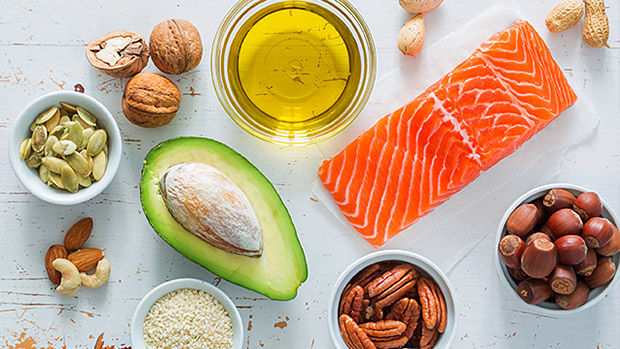Fat has the most calories per gram, which may be why people get so confused about how much to eat. My advice? Establish your go-to healthy fat sources and know which ones to avoid completely.
Your favorites will differ from mine, but generally, my main sources are olive oil, avocado, and almonds. I'd also include egg yolks in there, but I seldom have whole eggs and usually opt for egg whites instead. That's not for any health reason... other than I love egg whites slathered in Walden Farm's zero-calorie syrup.
As far as fat avoidance, avoid pro-inflammatory trans fats. This shouldn't be too hard since they're usually only found in overly processed foods that won't fit your usual eating habits anyway. You might ingest them during a cheat meal, but those aren't average days.
I don't eat butter or bacon. I also don't know of a lot of super-jacked dudes eating tons of butter or bacon either. There's a reason the great majority of people (wanting to improve their body comp) end up gravitating away from those foods.
Is There an Ideal Macro Ratio?
I get a million messages a day about macro percentages and how much of this or that someone should eat when it comes to fat and carb intake.
This seems to be the most confusing area for people, and I really can't figure out why. My only guess is that they aren't dropping body fat as quickly as they'd like. It's like they believe that if they stumble upon the magic macro ratio, then fat will start melting away faster than Al Gore said the ice caps would.
It's hard to really address one macro without addressing them all, because inevitably someone will ask about it in relation to the other one. It's like when your buddy asks about the relationship status of that hot girl, and you tell him she's taken, then he goes, "Well what about her sister?"
So let's address all three...
Protein
Once it's dialed in, it never goes down! Ever. Do not for any reason reduce protein intake from 1-1.25 grams per pound of bodyweight. And now your question is, "Well, is it 1 or is it 1.25?"
This is how anal the internet gets. It's 1 to 1.25. That means your minimum intake is 1 gram per pound of bodyweight, but if it floats your boat, or you're in a super hypocaloric state, like in contest dieting, you can up the protein a bit.
Fat
So how much fat should you eat exactly? The right amount for you depends. Some people seem to become fat adapted much easier/faster than others, and do very well energy wise (and increased fat oxidation wise) with low carb/high fat or possibly ketogenic.
Carbs
Some people do well with higher carbs and lower fats. They also tend to be very insulin sensitive and can turn carbs into glucose very easily.
"Well, how do I know if I'm that person?"
It's up to you to experiment and figure that out. No one can tell you that through a computer screen. I know the struggle is real, but in order to know how your body responds to certain diets and/or training you actually have to, you know, do them.
Pointers For Figuring It Out
There are a few clues I've noticed over the years, which tend to indicate whether someone is going to do better with a lower carb or lower fat intake.
Naturally skinny/lean guys, I've found, tend to do really well with lower fat and higher carb intake. Again, I'm just going off what I've seen. Guys that tend to lean towards the more "husky" side do well with lower carbs and moderate fat intake.
What does that look like percentage wise? For the naturally lean guy it's basically as little fat as possible. So maybe 10% of their caloric intake coming from fats.
For the husky bro it's as little carb intake as possible, with most carbs coming in the first post-workout meal. The rest of the day it would be trace carbs coming from veggies only.





